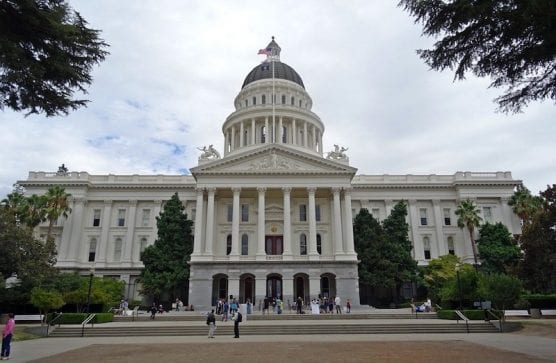SACRAMENTO — In the final hours of an extraordinary session bottlenecked by the coronavirus pandemic, the California Legislature crammed bills to pass police reforms, prevent evictions and curb the newspaper industry’s demise into Monday’s agenda.
From within the state Capitol in Sacramento and in some cases their own homes, state senators and Assembly members are scheduled to vote on over 150 bills intended to cure the state’s most pressing issues before midnight.
After quickly passing $1 billion in relief in March, lawmakers broke for a pandemic-induced recess as the virus spread throughout the Golden State.
The impromptu delay postponed committee hearings and floor sessions, and also complicated budget negotiations with Governor Gavin Newsom. When the virus’ first wave relented and lawmakers returned, they were forced by party leaders to trim their proposals and focus almost wholly on the pandemic and the state’s $54 billion deficit.
But as the state and Legislature slowly reopened, the killing of George Floyd by Minneapolis police in late May and the resulting protests once again threw a wrench in California’s legislative agenda.
Newsom jumped on the moment to ask on the Democratic-controlled Legislature to send him police reforms, calling it an opportunity to “reimagine” law enforcement’s role in the nation’s largest state.
Wasting little time, lawmakers responded with a flurry of proposals aimed at increasing investigative oversight over cases of police violence and fighting systemic racism.
“Join us in playing a leading role in the next coming attraction in reforming racism and police brutality in this state as well as this country,” state Sen. Steven Bradford, vice chair of the California Legislative Black Caucus, urged his colleagues in June.
Many of the June proposals haven’t survived the truncated session. But on Monday, lawmakers are slated to vote on a carotid chokehold ban, a mandate for state investigations of all deadly cop shootings and a decertification process for crooked and violent officers.
The pandemic has caused major operational and logistical changes in recent months, forcing the Legislature to conduct hearings with limited in-person access for the media and public. In addition, the Assembly voted to allow members the opportunity to vote on bills remotely.
Though the Senate initially shunned the idea of proxy or remote voting, it reversed course last week when state Senator Brian Jones, a Republican whose district encompasses much of inland San Diego County, tested positive for the virus. In the final days of the session, most of the Senate GOP Caucus has been participating via Zoom from their home districts.
In a rare series of weekend floor sessions, lawmakers gave final approval to several notable measures.
Bills landing on Newsom’s desk include: a task force to study the lingering effects of slavery and potential reparations for black Californians, requirement that California’s 662 publicly traded companies include at least one non-white member on their corporate boards, a proposal requiring food delivery companies like Uber Eats and Doordash to sign agreements with restaurants before offering their products, and a 75% reduction of single-use plastic containers by 2032.
“We have an opportunity to phase out nonrecyclable single-use plastics and transition California to a circular economy that encourages manufacturing of cleaner products in the state,” said Assemblywoman Lorena Gonzalez, author of Assembly Bill 1080.
Lawmakers also voted to limit the cost of commissary goods and phone call fees for inmates at county jails, a new process to allow people working on an inmate firefighting crews to retain similar jobs upon release from custody, ban of dog and cat sales by retailers and framework to allow Native American tribes to recover artifacts from state universities.
“This bill is vital to preserve our tribal culture and ensure Native American tribes have the opportunity to pay honor and respect to our ancestors and elders,” said Assemblyman James Ramos, the first Native American elected to the Legislature.
— By Nick Cahill, CNS
Like this:
Like Loading...
Related





 Tweet This
Tweet This Facebook
Facebook Digg This
Digg This Bookmark
Bookmark Stumble
Stumble RSS
RSS


























REAL NAMES ONLY: All posters must use their real individual or business name. This applies equally to Twitter account holders who use a nickname.
0 Comments
You can be the first one to leave a comment.